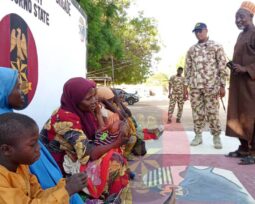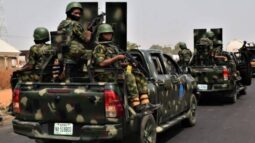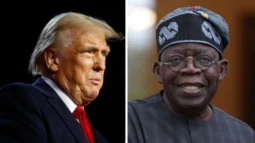As Nigeria approaches the 2027 presidential election, the political landscape is already buzzing with speculation about who will secure the support of the country’s diverse regions. Northern Nigeria, a region with significant electoral influence due to its large population and historical voting power, played a pivotal role in President Bola Ahmed Tinubu’s victory in the 2023 presidential election. With over 60% of Tinubu’s votes coming from the North, particularly the North-West, the region’s support was instrumental in his emergence as president. Several factors suggest that Northern Nigeria may once again rally behind Tinubu in 2027, driven by his administration’s policies, regional political dynamics, and strategic alliances. This article explores the key reasons why the North is likely to back Tinubu for a second term.
1. Fulfillment of Electoral Promises and Infrastructure Development
One of the primary reasons Northern Nigeria may support Tinubu in 2027 is his administration’s focus on delivering on electoral promises, particularly in the areas of infrastructure, energy, and agriculture. Governor Inuwa Yahaya of Gombe State, who also serves as the Chairman of the Northern States Governors’ Forum, has been vocal about the tangible benefits the North has seen under Tinubu’s leadership. He has highlighted flagship projects such as the Abuja-Kaduna-Kano Expressway, the Kano-Katsina-Maradi rail line, the rehabilitation of the Kaduna Refinery, the Abuja-Kaduna-Kano Gas Pipeline, and ongoing oil drilling at the Kolmani Oilfields. These initiatives are seen as critical for industrial growth and energy security in the region.
Yahaya emphasized that these projects are not mere promises but real investments in the North’s economic future. For instance, the creation of the Federal Ministry of Livestock Development has been described as a “generational breakthrough” for modernizing Nigeria’s pastoral economy, which is particularly significant for the North, where livestock farming is a major economic activity. Such developments resonate with Northern voters who prioritize economic progress and infrastructure that directly impacts their livelihoods.
2. Political Stability and the North-South Power Rotation
The concept of rotational presidency between Nigeria’s North and South has been a cornerstone of political stability since the return to democracy in 1999. Senator George Akume, the Secretary to the Government of the Federation, has argued that the North’s turn to produce the president will come in 2031, not 2027, as Tinubu’s presidency represents the South’s current tenure. This perspective aligns with an unspoken agreement among Nigeria’s political elite to alternate power between regions to ensure national unity.
Akume has cautioned against calls for a Northern presidency in 2027, describing them as political mischief that could destabilize the country. He emphasized that Tinubu has not neglected the North, pointing to landmark interventions in infrastructure, security, education, and agriculture as evidence of the administration’s commitment to the region. This narrative of fairness and equity in power-sharing is likely to appeal to Northern leaders and voters who value national unity and stability, encouraging them to support Tinubu’s re-election to complete the South’s tenure.
3. Strong Regional Support from Northern Governors and Stakeholders
The Northern States Governors’ Forum, led by Governor Yahaya, has been a vocal advocate for Tinubu’s re-election. At a two-day interactive session organized by the Sir Ahmadu Bello Memorial Foundation in Kaduna, Yahaya declared that the North would back Tinubu in 2027 due to his “visible achievements and fulfilled promises” to the region. This endorsement is significant, as Northern governors wield considerable influence over their states’ voting patterns. The presence of key figures like Kwara State Governor Abdulrahman Abdulrazaq and Minister of Information Mohammed Idris at the event further underscored the administration’s commitment to engaging with Northern stakeholders.
Moreover, the All Progressives Congress (APC), Tinubu’s party, has officially endorsed him as its sole candidate for 2027, with the party’s National Chairman, Abdullahi Ganduje, affirming this position at a summit in Abuja. The APC’s strong organizational structure in the North, coupled with its ability to mobilize voters, enhances Tinubu’s prospects in the region.
4. Security Improvements and Regional Engagement
Security remains a critical issue in Northern Nigeria, where banditry, terrorism, and communal clashes have long plagued communities. Tinubu’s administration has made strides in addressing these challenges, with Yahaya noting that over 300 terrorist and bandit leaders have been neutralized under Tinubu’s watch due to improved intelligence and coordinated security operations. While insecurity persists, these efforts demonstrate a commitment to tackling one of the North’s most pressing concerns, which could sway voters in Tinubu’s favor.
Additionally, Tinubu’s administration has engaged Northern leaders through platforms like the Kaduna interactive session, where ministers, service chiefs, and heads of parastatals from the North defended the government’s record. This engagement fosters a sense of inclusion and counters narratives of marginalization, such as those propagated by critics like Rabiu Musa Kwankwaso and the Arewa Consultative Forum.
5. Economic Reforms and Long-Term Vision
While Tinubu’s economic reforms, such as the removal of fuel subsidies and the liberalization of the exchange rate, have caused short-term hardship, Northern leaders like Yahaya have defended them as necessary for long-term economic stability. The North, which contributed significantly to Tinubu’s 2023 victory, is being positioned to benefit from these reforms through projects that promise industrial growth and energy security. For instance, the rehabilitation of the Kaduna Refinery and the Kolmani Oilfields could transform the region’s economic landscape, providing jobs and boosting local economies.
Furthermore, APC chieftain Podar Yiljwan Johnson has expressed confidence that Nigerians, including Northerners, will re-elect Tinubu in 2027 because his policies are laying a “solid foundation” for the country’s economic recovery. This optimism, coupled with visible progress, could convince Northern voters to remain patient and support Tinubu’s vision.
6. Weak and Fragmented Opposition
The opposition’s disarray is another factor that strengthens Tinubu’s position in the North. The Peoples Democratic Party (PDP), Labour Party, and New Nigeria Peoples Party (NNPP) have struggled to present a united front, with internal crises and defections weakening their appeal. Tinubu himself has predicted more defections to the APC, stating, “That is the game,” indicating his confidence in consolidating political support.
In the 2023 election, Tinubu outperformed expectations in the North-West, securing 2.65 million votes compared to Atiku Abubakar’s 2.2 million, despite Atiku being a Northern Fulani candidate. The Labour Party’s Peter Obi, while popular among young and urban voters, drew significant Christian votes in the North, fragmenting the PDP’s base. With opposition candidates like Atiku, Kwankwaso, and Obi unlikely to coalesce around a single candidate, Tinubu’s APC remains well-positioned to dominate the Northern vote in 2027.
7. Historical Voting Patterns and Political Alliances
The North-West, the largest voting bloc in Nigeria, was critical to Tinubu’s 2023 victory, contributing nearly one-third of his total votes. The APC’s strong presence in states like Kano, Jigawa, and Zamfara, combined with the strategic selection of Kashim Shettima, a Northern Muslim from Borno, as Tinubu’s running mate, helped secure this support. The Muslim-Muslim ticket, while controversial, did not significantly dent Tinubu’s Northern votes, as APC voters largely remained loyal to the party.
The North-Southwest political alliance, historically a stabilizing force in Nigerian politics, continues to resonate with Northern leaders who see Tinubu as a partner in national development. Yahaya has echoed the late Sardauna of Sokoto’s words, stating, “The North’s strength lies in its unity with all Nigeria,” reinforcing the importance of this alliance.
Challenges and Counterarguments
Despite these factors, Tinubu faces criticism in the North, particularly from groups like the Arewa Consultative Forum and some former legislators who argue that his administration has marginalized the region and deepened economic hardship. Political analyst Mohammed Aliyu has warned of a potential backlash in 2027 if Tinubu fails to address poverty, insecurity, and unemployment. However, these criticisms are countered by Northern governors and APC leaders who highlight ongoing projects and the necessity of Tinubu’s reforms. The split among Northern stakeholders, with some rejecting endorsements of Tinubu as unrepresentative, suggests that his campaign will need to address these grievances to maintain broad support.
Conclusion
Northern Nigeria’s likely support for President Tinubu in 2027 hinges on his administration’s delivery of infrastructure projects, commitment to regional development, and the political stability offered by the North-South power rotation. The endorsements from influential Northern governors, the APC’s strong organizational presence, and a fragmented opposition further bolster Tinubu’s prospects. While challenges like economic hardship and insecurity persist, Tinubu’s strategic engagement with the North and visible progress in key areas make him a formidable candidate for re-election. As Yahaya noted, “The North, believing in his vision, contributed over 60% of the winning votes” in 2023, and with continued delivery, the region is poised to back him again in 2027. For Tinubu to secure this support, however, he must address the region’s concerns and sustain the momentum of his Renewed Hope Agenda to ensure that Northern voters see tangible benefits by the time they head to the polls.







